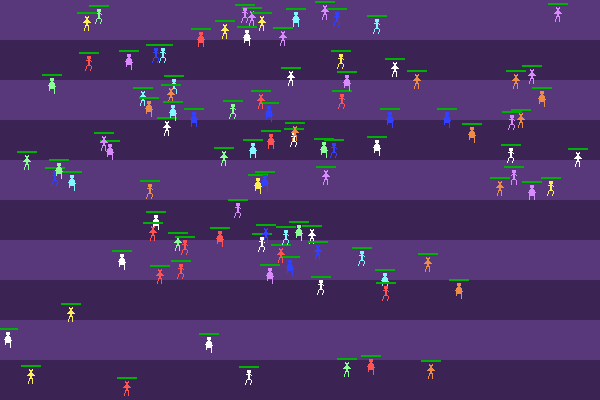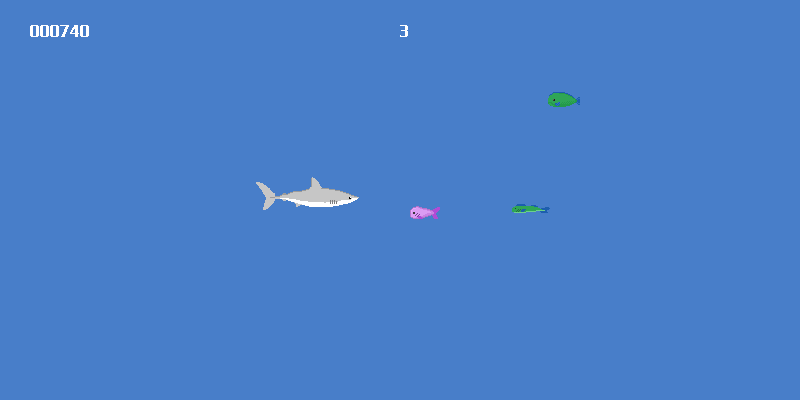Projects
An incomplete list of interesting projects I have worked on since childhood
2024
TomVM (with Exercises)
Improvements to my Rust VM and assembler, now with a full C-like programming language. This website has a series of exercises to introduce the VM and assembler (wip).
ROBOSHOOT (working title)
Experimenting with the Bevy game engine in Rust by building a Megaman inspired roguelite.
4 Tile Puzzle
Inspired by a wooden puzzle I own, I built a browser-based version of the puzzle. This is easy to start, but hard to finish. Hacked out in one HTML file just like I would do in the old days. No mobile support (yet).
2023
Rust Simple VM (WIP)
Learning more about Rust by building a small 16-bit virtual machine.
Crab Pong
Learning Rust by experimenting with a small web game.
2022
Pew (a small Playstation 2 game)
A tiny asteroids-inspired shooter for the Playstation 2. This game mostly exists to test the 2D functionality of the core engine, and consuming my own engine forced me to make many improvements to the code. Despite this game being simple and ugly, it has provided a lot of value towards my larger goal of building Playstation 2 games.
 A typical gameplay scene in Pew
A typical gameplay scene in Pew
Discord Bot From Scratch
After discovering that the popular Python Discord library discord.py was no longer being maintained, I decided to do things the hard way and integrate with Discord myself.
The bot can work with the Discord REST and Gateway (aka websocket) APIs. The websockets integration allows the bot to respond to events, so for my use case it will add a role to a user when they react to a specific message.
The bot will eventually manage my Discord server, but there are a few bugs to squash before then!
Playstation 2 Homebrew - 2D Draw APIs, Math and Library Improvements
In early 2022 I have continued work on my Playstation 2 homebrew library. I fixed many issues with the 2D renderer’s texturing, and extended the renderer to support colour palettes in PS2 hardware. The renderer now has a C backend rather than just pure Lua (the backend used can be configured at startup) which is much faster, so it can now render way more geometry while maintaing a reasonable FPS.
I added Lua bindings for doing vector and matrix math, which was needed to start creating games using the library. The math APIs also pushed me to add unit tests. I can’t run the PCSX2 emulator “headless” in my CI pipeline yet, so these tests are run on program startup for now.
Overall the library is a lot more stable now, and can definitely support games. I just need to write a lot of documentation so that other people can use it!
 A geometry stress test from my library examples
A geometry stress test from my library examples
2021
Lisp Game Jam Attempt - Failed Playstation 2 Dungeon Crawler
I attempted to make a simple 2D dungeon cralwer in fennel for Lisp Autumn Game Jam 2021, but didn’t end up submitting anything. I used my custom Playstation 2 Lua engine which is not very mature, and encountered many technical problems. The final game is playable, but has some graphical issues and is not very fun :D
Playstation 2 Homebrew Livestreams
I stepped back to square one and started documenting my process of building software for the Playstation 2, first in C and later incorporating Lua. This is a huge ongoing piece of work that will continue well beyond 2021, but it started here!
Nim Lisp Interpreter
To continue developing my knowledge of Lisp and to learn a new programming language Nim, I implemented a very simple Lisp interpreter. The macro compile-time code generation capabilities of Nim are very interesting for writing code which plays well with Lisp, such as automatically generating code which binds runtime Lisp function arguments (in the form of a Cons-list) to variable names, possibly even with auto-generated type checking.
Sadly I have lost the source for this :(
 The very verbose output of my Lisp interpreter proving it is capable of basic addition
The very verbose output of my Lisp interpreter proving it is capable of basic addition
7 Day RogueLike 2021
I attempted to make a small roguelike platformer in 7 days for a game jam. Overall I didn’t succeed in making a roguelike, but I did make a functional game with random levels. I’m happy with what I achieved in the timeframe, however as it isn’t really a roguelike I did not submit it to the jam.

 Programmer art in full swing with a 7 day deadline
Programmer art in full swing with a 7 day deadline
2020
Lisp Interpreter
I wrote a simple Lisp interpreter in C based on McCarthy’s 1959 paper. It has the minimal set of functions to be an interpreter and a simple interface for binding C functions to be called from Lisp. It has no garbage collection so is quite limited in what it can run.
Playstation 2 Graphics Synthesizer Buffer/DMA Utilities
I’ve been interested in Playstation 2 hardware since 2019 and have a few small experiments resembling games. One headache has been managing the state of buffers which are sent to the Graphics Synthesizer (rasterizer). I wrote some utilities for a managed buffer which automatically builds DMA headers and Graphics Synthesizer “packets”. This is currently embedded in a rendering example here, but it will be polished and extracted to a self-contained library in the future.
 A simple .obj renderer running in a PlayStation 2 emulator
A simple .obj renderer running in a PlayStation 2 emulator  A simple gameplay test for a PlayStation 2 arcade shooter
A simple gameplay test for a PlayStation 2 arcade shooter
2019
Quake 3 Server Browser API and Discord Bot
In Quake 3 sending queries to get server status is done over UDP. I wanted to make this easier, so I wrote and hosted a web service which periodically queried all public Quake 3 servers and exposed their status (player counts, game settings, admin contact details and more) in a REST API. I then built a Discord bot which allowed members of my Discord server to use a !command to prompt the bot to report player activity in local servers.
2018
I volunteered to build a survey for an honors student conducting research at the University of Adelaide. The survey contained interactive sections which were outside of what is possible with survey builders and existing survey web frameworks/libraries. My solution was built in HTML and Javascript, with some data pre-processing for survey question/activity data in Python. I also built the data collection backend, which was a simple NodeJS app storing data in MongoDB.
2016
C Game Experiments
To learn more about lower level programming I dove into C and built simple games using the SDL2 library.
 A test of displaying many interacting characters
A test of displaying many interacting characters  Shark Game was an arcade-style game about eating fish
Shark Game was an arcade-style game about eating fish
2015
Music Playlist Generator
My first paid programming project was for my local doctor’s clinic, building a system to randomly generate Windows Media Player playlists from a large collection of music. This was my first project where I had to gather requirements myself. I had to work under tight restrictions and understand data structures to effectively track which songs had been considered already while selecting a variety of genres and artists, based on song metadata as well as a song’s filesystem path. The system worked well and was in use years later when I visited the same clinic.
2014
Card Layout System
A very modular system which took a list of card data and arranged them into A4 pdfs for printing. Used for generating sheets of Magic: The Gathering proxies, but I had ambitions of prototyping my own card game with it that never came together. This was a strange mishmash of Python and Batch scripts. I learned a lot from this project by finding ways to glue together existing solutions with my own small scripts to make a larger system.
2013
Java Games
Simple Java games mostly from a top-down perspective. My first Java game “Text Game” was console based, but later ported to a graphical game. I built some simple platformers, but never finished anything other than example levels. I spent a lot of time thinking about structuring my code into “engine” and “game” sections, which enabled me to share a lot of code between projects.
2006-2009
GameMaker Games
I started programming with GameMaker, first with the drag-and-drop interface but eventually writing code in “GML”, a Java-like language. These games impressed my school friends, but are very primitive.
 My 2007/2008 game's gimmick was creating platforms you could jump on by clicking the mouse
My 2007/2008 game's gimmick was creating platforms you could jump on by clicking the mouse
 A typical gameplay scene in Pew
A typical gameplay scene in Pew A geometry stress test from my library examples
A geometry stress test from my library examples The very verbose output of my Lisp interpreter proving it is capable of basic addition
The very verbose output of my Lisp interpreter proving it is capable of basic addition
 Programmer art in full swing with a 7 day deadline
Programmer art in full swing with a 7 day deadline A simple .obj renderer running in a PlayStation 2 emulator
A simple .obj renderer running in a PlayStation 2 emulator  A simple gameplay test for a PlayStation 2 arcade shooter
A simple gameplay test for a PlayStation 2 arcade shooter A test of displaying many interacting characters
A test of displaying many interacting characters  Shark Game was an arcade-style game about eating fish
Shark Game was an arcade-style game about eating fish My 2007/2008 game's gimmick was creating platforms you could jump on by clicking the mouse
My 2007/2008 game's gimmick was creating platforms you could jump on by clicking the mouse